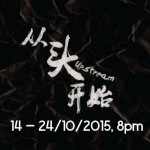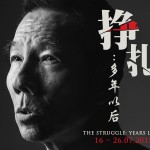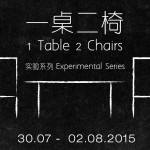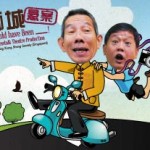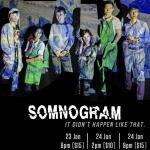“The Struggle to Look Back”
Reviewer: Sam Kee
Performance: 16 October 2015
Before one can move on, you need to sort out the clutter, tie up the loose ends and clear out the contents of your soul that have been weighing you down. It is a timely challenge Liu Xiaoyi has given his fellow collaborators in The Practice Lab to examine the clutter in their lives before they move on. That is done in conjunction with The Theatre Practice (TTP) moving on and out of their current site at Stamford Arts Centre.
Upstream takes the form of 11 monologues (divided into 2 groups, performed on alternate nights). They are composed of selected life events that resonate a theme significant to the performer. Tonight, I am watching 6 of the artists take the stage to confess their past traumas, struggles and regrets. What sets these narrative-performative works apart from a typical confession at a shopaholic support group? The answer lies in the dramatic composition.
Zee Wong first sets up a mysterious relationship between her and an inanimate object – a pensive bowl of water. I squirm while she unpicks her stitches, reopens her wounds and become vulnerable to the judgements of the audience. But as she drones on about the blemishes in her life, the engagement with the audience slowly wears off. Zee eventually reveals her black, painted palms, but her interaction with the prop comes albeit a little too late. Seconds before the light goes out, we see her reaching out to the bowl. Is she going to clean her tainted palms? Can she wash off the blemishes? Is she willing to get rid of those memories? Or perhaps, she just wants to throw the bowl of water away and carry on with her life.
On the other hand, actor Ric Liu decides to use his prop to its fullest potential. The white wooden chair, a signature feature in many TTP experimental shows, now acts as Ric’s pregnant mother, stairs, escape route and the sea. Although I feel that some parts of the monologue may have been overly animated, Ric has sequenced a good selection of events in a non-linear way. There are a few clever stitching of seemingly non-sequitar events. He then revisits the events leading up to his birth, and wraps up by re-enacting the close shave his mother had with a miscarriage. Ric questions his existence, and I think he still does not have an answer.
The most complete dramatic piece is presented by Felix Hung. She explores her difficult relationship with her father. It plays out as an analogy of the complex ties between Hong Kong, its colonial master, the United Kingdom, and with China. Felix deals with the topic of death and anguish wittily, using a comedic monologue. In presenting her stories to the audience, Felix takes on several roles, including a caricature of a talk show hostess. The act seems characteristic of Felix’s usual self – bubbly, whimsical and humorous. But beneath this strong and cheerful facet, lies her insecurities. Perhaps that is why she chooses to examine her self from a third person’s point of view.
Essentially, we must realise that some traumas become committed to muscle memory – they cannot be forgotten or forgiven, like how you will never forget how to ride a bike. The struggles make us who we are, and we simply must find a way to move on. In a way, Upstream can be likened to a forum theatre. This experimental series allows audience to gain access to the performers and realise that artistes, too, are of flesh and blood.
Do you have an opinion or comment about this post? Email us at info@centre42.sg.
ABOUT THE PRODUCTION
UPSTREAM by The Theatre Practice
[The Practice Lab Production]
14- 24 October 2015
Stamford Arts Centre
ABOUT THE REVIEWER
Sam Kee is currently helming the literary and visual arts section at artsrepublic.sg while putting her major in Mathematics to good use at an educational publishing house.

